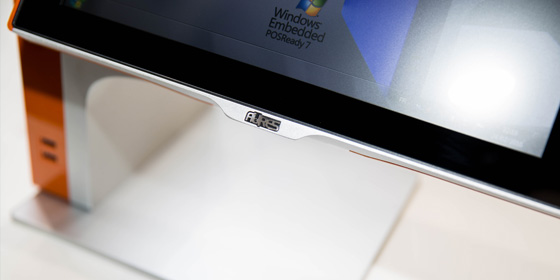As a highly strategic Support Service, the quality of an After-Sales Department is a key element in the customer satisfaction and loyalty process, especially when it comes to equipment and technological solutions.
Beyond the essential implementation of online tools which participate in this facilitated management of the after-sales service for the POS, the original design and conception of the point of sale equipment must be taken into account and constantly evolve; in order to limit the number of breakdowns and product returns – and the costs induced by these failures – but also to reach an optimised level of reliability, in the longer run.
While the AURES Group has significantly increased its sales in recent years, going for example from less than 10,000 EPOS sold in 2008 to more than 70,000 for the year 2017, the corresponding breakdown rates and the accompanying RMA* requests are proportionally in free fall.
*Return Merchandise Authorisation
Why?
Simplified AURES designs and hardware accessibility in less than no time
Designing products that are accessible and that can be disassembled in no time at all has been an important feature of AURES product design and creation for many years.
The AURES Group is the only manufacturer to offer – for years – hard disks and motherboards which are mounted on racks (kinds of sliding mini traps); they can be accessed without any tool and by any user even non-technicians; thanks to this small revolution, there is no need to be an experienced expert or equipped with a toolbox to access the EPOS to replace a simple hard disk or some component of the motherboard, for example.
This saves time and money, both for users and AURES after-sales services, which can devote themselves to technical issues of more pressing matters.
Modular design of AURES equipment
AURES modular product designs make it possible for partners and customers to order fully customised equipment, according to their needs.
AURES thus integrates the same families of subsystems, motherboards and processors – and sometimes of frames – in its various POS and KIOSK hardware ranges. This enable users to develop similar and coherent IT systems that are easy to maintain and upgrade over time.
The modular design of the AURES systems, combined with an exclusive guarantee (which can reach 10 years in some cases on the availability of components and sub-systems), allows customers and end users to directly deal with some technical issues (problems with updates, for example) without requiring the assistance of AURES after-sales services or any other external resources.
SSDs instead of traditional hard disks (HDD)
In the same way, AURES is among the very first POS manufacturers to have generalised Solid State Drive (SSD) on its point of sale systems, replacing the traditional hard disks, more fragile and thus subject to more frequent failures.
As we mentioned in a previous post, SSDs are intrinsically and materially much more resistant than traditional hard disks. They lack all the moving and mechanical components that make up HDDs (Hard Drive Disks), which makes them much more reliable and almost insensitive to shocks and vibrations.
Moreover, this total absence of moving mechanical parts that characterises SSDs allows them to emit practically no heat source; this is very important at the POS where the overheating of the hardware was not very long ago, one of the main reasons of various breakdowns and failures.
Much more expensive a few years ago than conventional HDDs, SSDs have gradually gained in reliability, power and performance, while becoming much more affordable as their technology has become more popular and widespread.
For all these reasons, AURES now offers SSDs as standard – instead of hard disks – on all the hardware and POS equipment in its range, which also contributes to the development of this concept of truly facilitated After-Sales Service over the long term.
Highly resistant capacitive touch panels
Rather rare and expensive a few years ago, the capacitive and multi-touch panels that equip AURES POS systems offer unparalleled precision and responsiveness; their very high resistance over time (to shocks, scratches, liquid splashes, etc.), their non loss of colour or absence of wear at certain frequently used contact points (which is often the case in a point of sale), is a powerful argument in favour of easy and simplified after-sales services.
With the projected capacitive and multi-touch technology, EPOS and PC panel screens have now become considerably hardened and are less and less in question during RMA requests (for return of products in the workshop to the after-sales service)
Built-in POS Peripherals
Integrating certain peripherals or accessories at the POS (“built-in”) is another way to access a simplified and easy after-sales service; AURES was once again one of the first manufacturers to develop and exclusively offer this new generation of peripherals that are almost tailor-made and integrated into the hardware.
Practical and ergonomic, these readers or scanners (barcodes, cards, badges, biometric and omni-channel supports…) are delivered integrated into the hardware and considerably free up the space of the sales counters; small, discreet and ultra-compact, they literally blend into the sides of the machines and also present no visible wire.
But how did they lighten maintenance procedures and relieve after-sales service congestion?
At AURES, we found that the failure and breakage rates of non-integrated devices were far too high; at the point of sale, a manual scanner is subject to many manipulations, daily and permanently; it can easily get damaged, fall, break and even get lost.This is why, for many years now, we have been offering our customers and partners integrated accessories and peripherals; robust, reliable and discreet, they are much less weakened by the POS environment than external peripherals; they therefore participate fully in the fluidity and lightening of the after-sales service load.
New technologies for simplified and easier after-sales service
Online RMA requests
For several years now, AURES has implemented online processing management of RMA requests (requests to return equipment to the after-sales service), from a dedicated website.
The procedure, modernised and accelerated thanks to the web, has made it possible to reduce the number of phone calls, reduce line congestion – and significantly free up Hot Line and Help Desk working time. Technicians in charge of these issues therefore waste less time on minor breakdowns and can concentrate on subjects with more important technical issues.
In the end, the user or partner (IT reseller, software provider, etc.) benefits from a faster response and support, which ultimately constitutes to a positive element for customer relationship and satisfaction.
Data Computerisation and merging of all information technology resources via Microsoft Dynamics NAV
AURES various after-sales services are fully connected to the integrated management platform (ERP/PGI) Microsoft Dynamics NAV (former Navision) since 2009.
The sharing and merging of data and information flows between the various services is therefore done automatically, in full transparency and in real time, it covers commercial prospecting, account opening, order taking and processing, logistics (transport and delivery), RMA requests and warranty follow-up – and finally after-sales service interventions (on site or at AURES) and their follow-up.
AURES is of course taking all necessary measures regarding the implementation of the new General Data Protection Regulation (GPDR (link to AURES post GPDR AURES), in particular with regard to data processed via the integrated Microsoft Dynamics NAV software package.
Quality Charter
AURES after-sales services have set up extremely rigorous Quality Charters, with written procedures in good and due form: beyond the mention of the guarantee of on-site intervention on D+1 (if requested before 4pm the day before), these Charters list the conditions and deadlines for the return of goods, the detailed schedules and reports of the follow-up of interventions and repairs, the details of the reports and audits carried out as well as the names of the technicians in charge of diagnostics and repairs.




